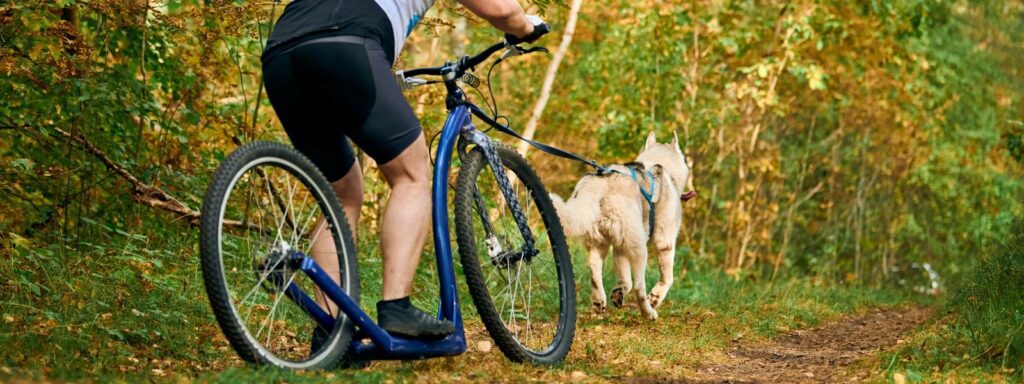Nutrition for Sporting and Working Dogs
 Synne Hemsen Berg
Synne Hemsen Berg
For dogs to be truly happy we need to engage them in both physical and mental activities. Sports, such as agility, flyball, scent work, canicross and sled pulling are a fun way to bond with your four-legged friend while satisfying their needs. Optimal nutrition is crucial in preparing our dog for activities so they can perform at their best. Each sport has unique requirements for performance, so tailoring a dog’s diet to provide the nutrients needed to harness endurance or explosive energy is crucial. The diet should also aid in recovery. In this blog, we will take you through various sports, nutritional needs and feeding tips for active dogs.
Dog Sports
Engaging in sports allows our dogs to channel their energy, keen minds, and innate abilities into positive activities. From the precision and agility displayed in obstacle courses to the remarkable speed in racing events, each sport offers a platform where dogs can truly shine, showcasing their unique skills and talents. Exercise goes beyond the physical wellbeing of our dogs but it is also fantastic for their mental health. It can even prevent boredom, mitigate stress, reduce separation anxiety and prevent destructive behaviour.
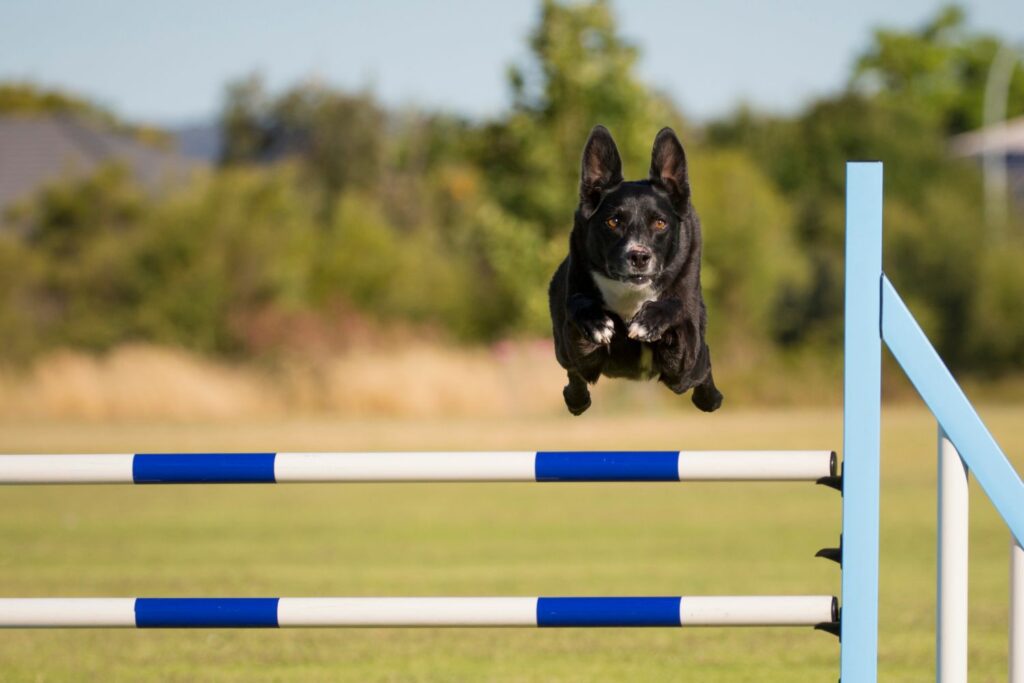
It is pertinent to note that growing puppies, should abstain from strenuous exercise until their joints have fully developed. If you are unsure of your dog’s fitness, consult your veterinarian to ensure your dog is physically prepared for the challenge. Some activities dogs can participate in include:
Agility
Agility is maybe one of the most well-known sports, offering a blend of physical activity, mental stimulation and excitement. Agility not only showcases a dog’s athletic abilities but their intelligence and responsiveness. An agility course is made up of various obstacles such as tunnels, jumps and weave poles.
Canicross
If you and your dog love running, this might be a great activity for you. It is a dog-powered sport where the dog is harnessed and attached to the runner by a bungee cord. It is a sport that is appropriate for most dog breeds and humans alike, just adjust running speed to your fitness level. Always use a harness made for pulling to keep your dog’s joints and you safe.
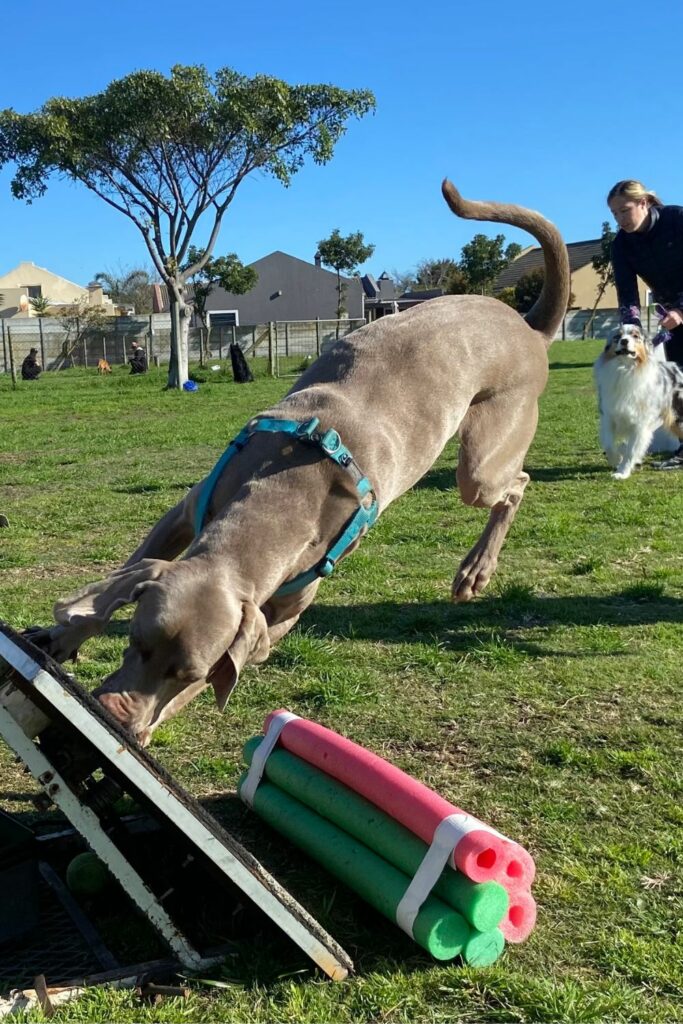
Flyball
A team sport for dogs of all sizes. It is a fast-paced sport where dogs leap over hurdles to retrieve a tennis ball in a relay-style race. Teams of four handlers and dogs compete against each other to achieve the fastest time. Flyball is suited to dogs that have a high ball drive and a good recall.
Sled Pulling
In the sun-kissed terrains of South Africa dog sledding takes a slightly different shape to the snow-filled sport we associate it with. In warm climates, we swap out the sled with bikes (also known as bikejoring) or carts. This is a fun sport for dogs bred for mushing like Huskies, Malamutes, and other sled-dog breeds who find running, pulling, and traversing trails very satisfying. It is important to not sled in hot temperatures, so this is a sport best suited for winter days that stay cooler (below 18 degrees for bikejoring).
Scent Work/Tracking
Dogs naturally have an incredible sense of smell and a love for sniffing out hidden treats. This sport gives dogs every opportunity to use their amazing noses to detect different scents by teaching them to detect various odours and then indicate to you that they have detected a smell. This skill is often used by police and military dogs to find bombs, people and drugs. Nose work is an easy sport for you to set up at home and is appropriate for puppies.
Sports Dogs and Nutrition
Working and sporting dogs are top athletes and the training they undergo mentally and physically exceeds a daily walk or play session. Like athletes, sports dogs have specific nutritional needs that owners need to be aware of. Food that nourishes and restores is essential for maintaining good energy, focus and stamina throughout the season. A well-trained and healthy body is also more resistant and less prone to injury.
Brief, yet explosive activities — characteristic of sports like flyball or agility — necessitate only marginal caloric increments. Conversely, endurance-intensive sports, encompassing field trials and cart pulling, demand a more robust energy input, owing to the long distances the dogs are required to navigate.
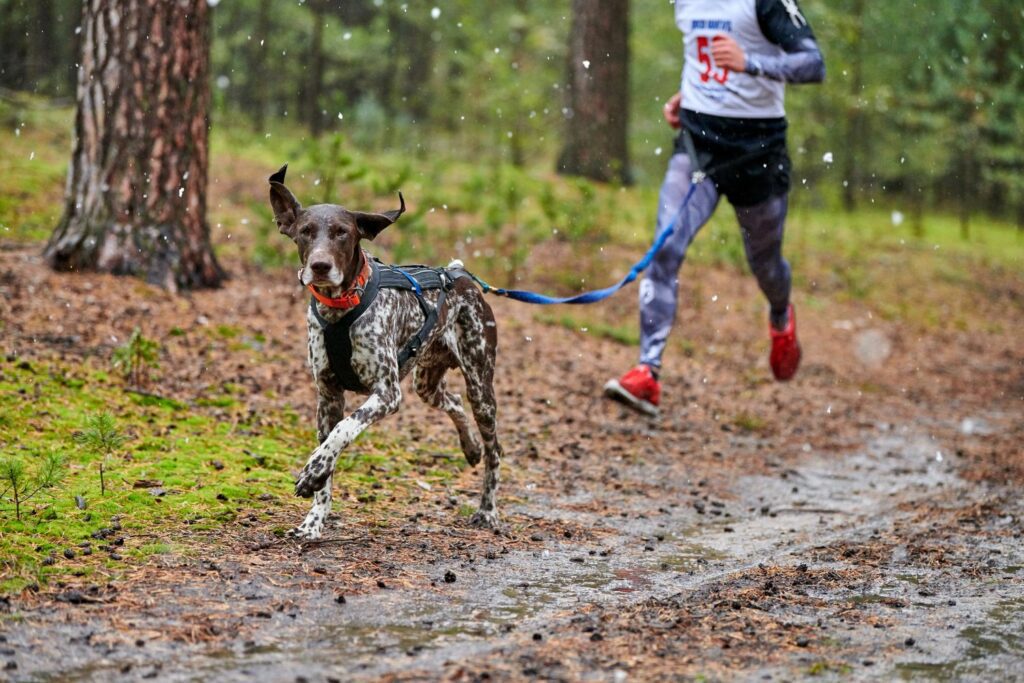
Beyond distance and the duration of exercise, additional variables, including thermal stress, terrain gradients, and ambient temperature, warrant consideration.
Engaging in a full day of rigorous activities can substantially deplete a dog’s energy. During such periods, an active dog may require as much as 4000 calories per day. To ensure your dog receives adequate calories and beneficial nutrients, options include amplifying the quantity of their usual food, integrating wet or raw food, or opting for specialised nutritional products. Methods to elevate the caloric content of dog food may involve:
- Fat and essential fatty acids: Healthy fats and oils add extra energy to the food. Olive oil, linseed oil, some fatty fish or some fatty cuts of meat can be added to the meal. Be sure to provide a balanced amount, as too much fat is not good for their health.
- Protein: Add extra high-quality protein such as ostrich, springbok, fish and goat. Scrambled eggs and boiled eggs are also excellent sources of protein and other important nutrients.
- Complex carbohydrates: This is a source of quick energy. Consider adding cooked quinoa, brown rice, oats or barley to your dog’s food for an extra calorie intake. Complex carbohydrates are also important for gastrointestinal health and are the brain’s preferred source of energy.
- Wet food: If you usually feed your dog dry food, consider mixing in some high-quality wet food. It is often more calorie-dense.
- Peanut Butter: A spoonful of peanut butter (make sure it does not contain xylitol, sugar or salt) can be a tasty and high-calorie treat on a trip.
- Lunchbox: Bring treats so your dog can get some extra energy throughout the day. Treats containing omega 3 can be particularly beneficial for cognitive health and flexible joints.
- Supplements: Dietary supplements containing omega 3, MSM, glucosamine, antioxidants, probiotics and L-carnitine (restores muscles) can be beneficial during a period when the body is exposed to harder work.
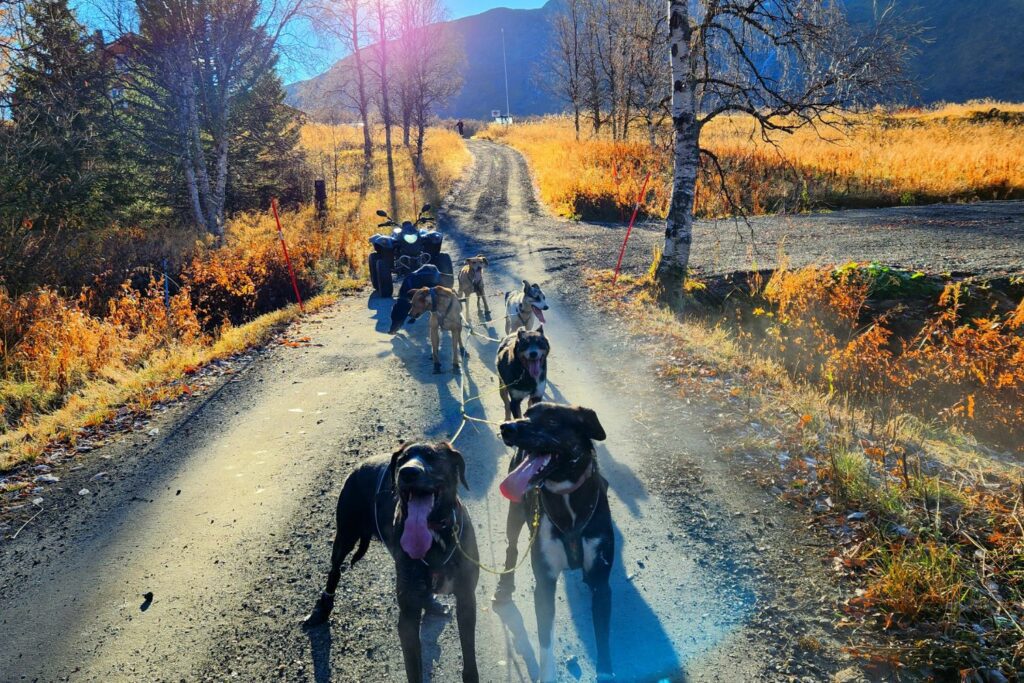
Mushing team X-it (above) eats Nala Health
Hydration
Your dog must always have access to fresh water during and after training sessions. Dehydration can quickly impair your dog’s performance and health. Some bone broth can be beneficial for active dogs as it hydrates as well as contains collagen which is good for the joints.
Nala Health for Active Dogs
Nala Health offers comprehensive and complete dog nutrition, with many ingredients that can benefit sporting dogs. During times of increased activity, one can feed a larger portion of Nala Health or supplement with extra protein and fats from wet food and homemade food to ensure they receive the appropriate calorie intake. Nala Health dog food contains:
- Insect Protein from Black Soldier fly larvae: A clean, allergy-friendly and sustainable protein source securing all the 10 amino acids your dog needs to build and repair muscles and bones. Protein can also be used as an energy source, however, fat and carbohydrates are the main energy sources during exercise.
- Taurine and L-Carnitine: These 2 amino acids play an important role in the health and vitality of your dog’s heart, immune system and brain health. L-carnitine mobilises fat for energy in the body.
- Probiotics: Maintains a healthy intestinal flora essential for nutrient absorption, the immune system and brain health.
- Healthy fat (Cold-pressed Canola Oil and Coconut Oil): Essential fatty acids are vital for brain function, joints and the maintenance of healthy skin and coat.
- Ancient grains (Sorghum, Millet, Oats): These gluten-free grains provide a steady source of energy throughout the day. Complex carbohydrates are the preferred fuel for sprinting dogs, both for the muscles and the brain.
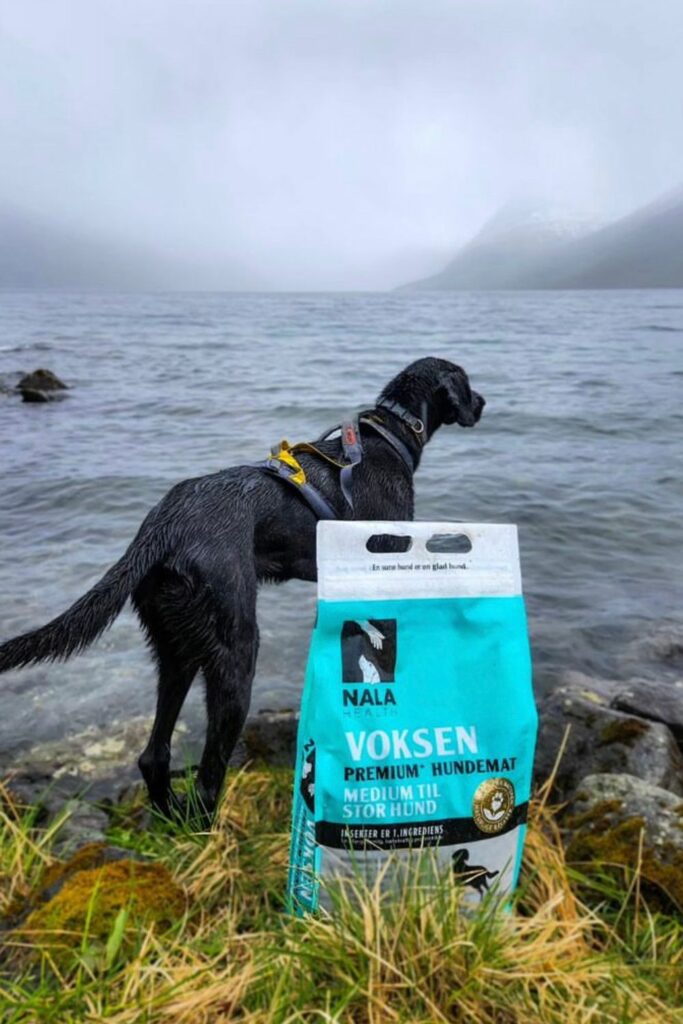
- Legumes (Peas, Lentils, Chickpeas): Good sources of plant protein contribute to the maintenance of muscles, provide a good feeling of satiety, and enrich the diet with fibre, iron, magnesium, potassium, zinc, folic acid and B vitamins.
- Brewer’s yeast and nutritional yeast: Rich in B vitamins, enzymes, minerals and amino acids. Particularly good sources of folic acid, zinc and biotin, which can have a positive effect on the skin and fur.
- Vegetables (Sweet potato, alfalfa, carrot): Add important vitamins, antioxidants and minerals that promote general good health and support the immune system.
- Chicory root: Contains inulin, a fibre that nourishes the microbiome in the gut and helps with optimal nutrient absorption. It can also help prevent the dog from becoming constipated or getting diarrhoea.
- Sea lettuce and Marine algae: Adds minerals and DHA omega-3 fatty acids to the food; good for joints, skin and cognitive health.
- Plant extracts: Contains mildly anti-inflammatory antioxidants.
Rooibos and Baobab fruit: Good sources of antioxidants that promote recovery and combat oxidative stress as a result of physical activity.
Tips for Feeding a Sporting Dog
Before training/competition: Feed your dog a few hours before training to ensure that your dog has digested the meal. Avoid feeding the dog immediately before an activity, as this can lead to discomfort and even a twisted stomach, which is a life-threatening condition.
After training: After training, you should give the dog some time to cool down before feeding it. This allows the body to return to a resting state, which reduces the risk of serious stomach problems.
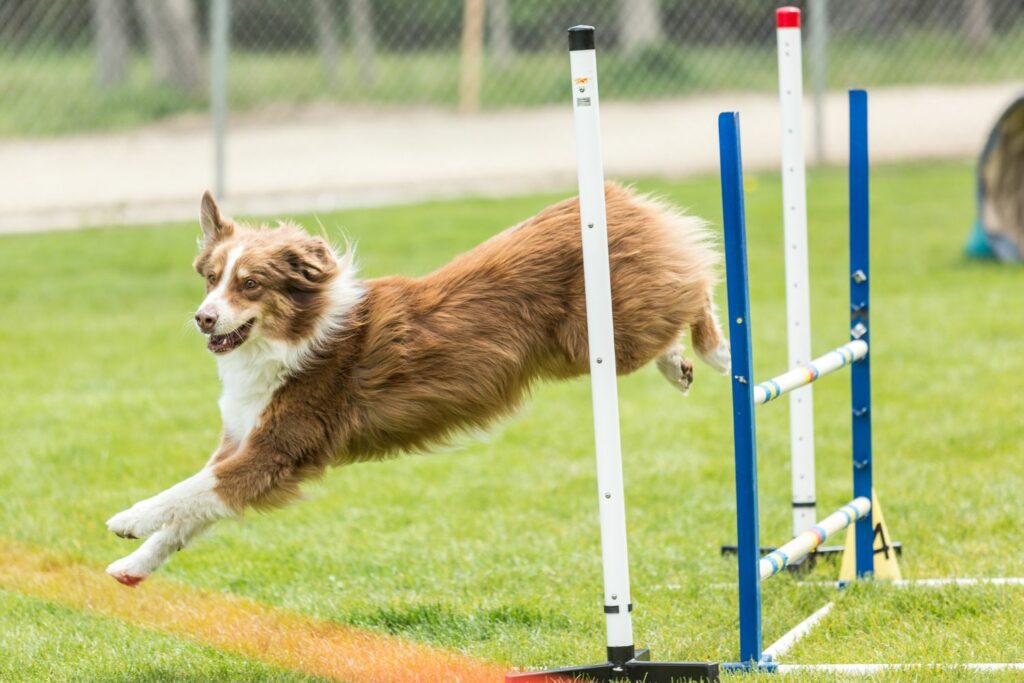
Monitor body shape: Monitor your dog’s weight, coat quality, energy level and general health. These can be indicators of whether the diet meets the dog’s needs or not. Give your dog more food if you see that he is losing weight.
Quality over quantity: Focus on the quality of ingredients rather than filling your dog’s bowl with low-quality food. High-quality commercial food without unnecessary fillers, or homemade, complete meals, ensures that your dog gets the nutrition it needs.
Participating in sports together with our dogs fosters a sense of belonging, community and joy. As owners, we must understand the importance of a balanced diet, especially during periods when our dogs are more active. When we take them on adventures in South Africa’s beautiful landscape, we must ensure that our four-legged companions are prepared physically, mentally and nutritionally.

